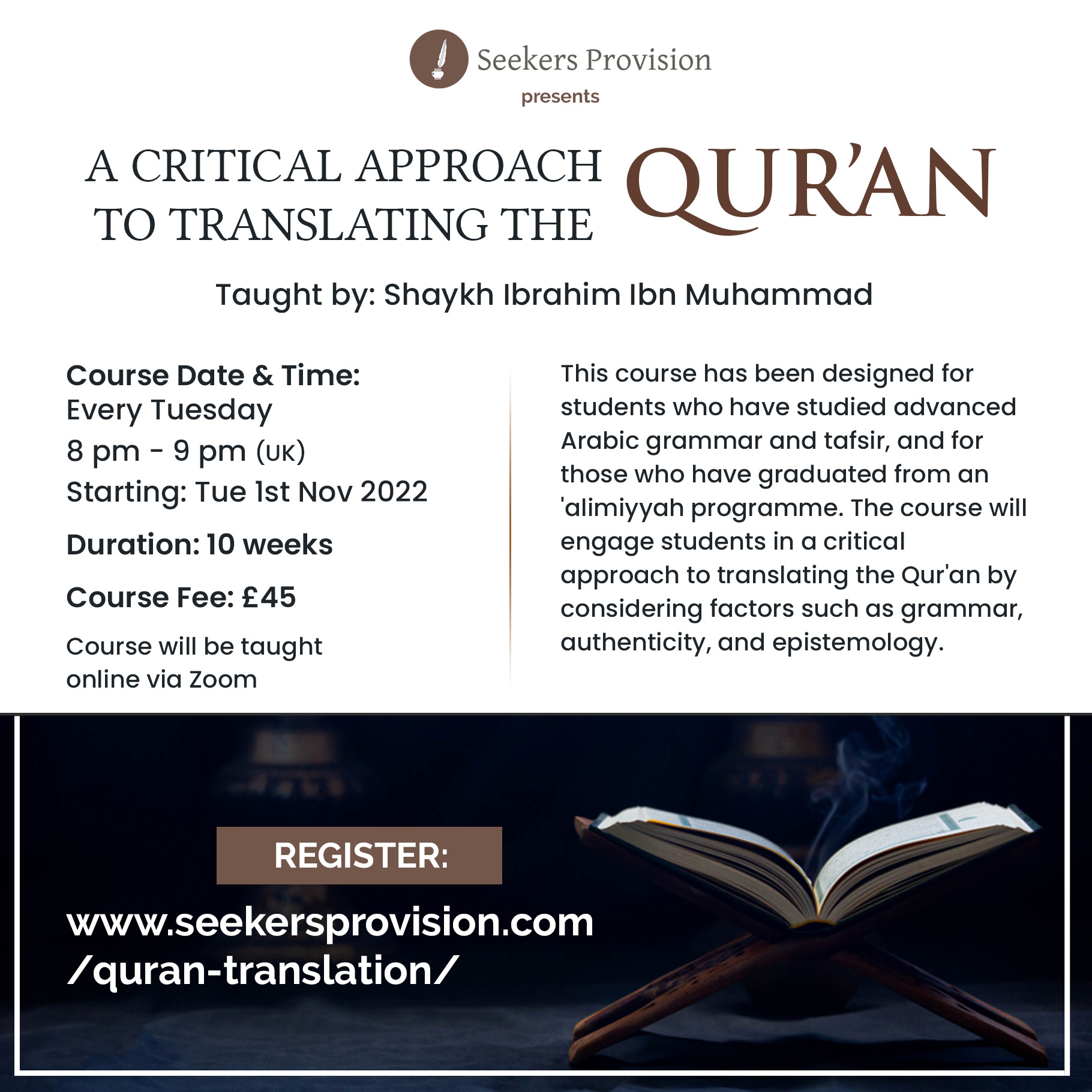A Critical Approach to Translating the Qur’an

Saeed (Sri Lanka):
“When I looked at the syllabus module of takkassus fi tafsir, I was thinking what this Quranic translation dars and also why ? But after starting to study I came to know this is one of the toughest subject. But Al Hamdulillah now I have learned how to handle a word when it comes to the Quranic translation, where to look and also how to match it with the context and so on. This is a must subject for those who are about to study the Quran tafsir.”
Zafr (UK):
I liked how in the first two weeks maulana got us to think and brainstorm reasons why translations differ and how certain factors would alter ones translation. This got me thinking of areas I’d overlooked and had never thought of before. We were introduced to tafaseer works showing the depth mufassiroon went into understanding a verse of the Quran and how they systematically collated the differences of opinion of grammarians, qurra, scholars of logha before choosing a translation. This was an eye opener as it taught me that exegesis of Quran requires a lot of effort and it isn’t merely about learning Arabic and just translating. It requires deep thought and analysis. I also liked how we put into practice what we learnt in the first two weeks to the remainder of the course looking at examples of how translations can go wrong. We were given the opportunity to translate verses of the Quran and our translations were verified and corrected by maulana Ibrahim.
A very good course for those wanting to grasp an in depth study of the meanings of the Quranic verses.
It has equipped me some key study skill sets for translating the Quran to our mother tongues. Alhamdulillah I benefitted a lot from this course jazakallahu khayran maulana.”
Hanzalah, UK:
“This course has served as a real eye opener into the depths of Qur’an translation. What I once assumed to be a rather straightforward task has now been unveiled as a challenging, complex work which requires the use of several skills.Shaykh Ibrahim has equipped me with tools to delve into translating verses with confidence and the realisation that to give justice to the translation of even a single verse requires critically thinking about one’s own philosophy in the translation, ensuring that the meanings conveyed are evidenced through classical tafasir, validating choices of words by referring to various ma’ajim, whilst keeping the nahw and sarf of the Arabic text at the forefront.
The course was practically structured in a manner which demonstrated why differences in translations exist, introduced various classical texts that would be beneficial when translating, allowed for practical research and translation whilst being challenged and guided through continuous support by the Shaykh.
An excellent course for anyone wanting to gain an insight into the intricacies of Qur’anic translation with an effective delivery in developing the skills required for the difficult task.”
Mahjabeen (UAE):
“Alhamdulillah very grateful for this priceless opportunity to have studied the course Quranic Translations- A Critical Analysis with Mufti Ibrahim Ibn Muhammad.
It is amazing to look back and find such significant growth and learning within 12 classes!
I started this course thinking the Blessed Quran is easy to translate because of its often repeated words and phrases but was humbled at discovering that oftentimes even translations of a single pronoun involve much deeper research into dependable classical texts and tools to avoid inaccuracies and indeed translation of the Noble Qura’n is a weighty responsibility.
The mind expanded knowing that slight variations in words of translation are not mere language constructs but are backed by solid evidence as to why a certain translator preferred one word over another.
The teacher introduced us to the right tools, demonstrated methods of research and translation, stretched us with challenging assignments, provided opportunities to work collaboratively and encouraged developing an inquiry mindset and a personal style in approaching this field.
I would definitely invite scholars and teachers of tafsir to enroll and benefit from this course. No words can do justice in explaining the benefits.”
